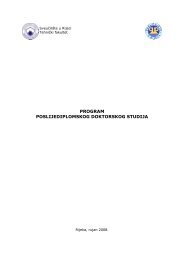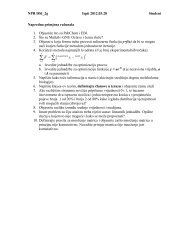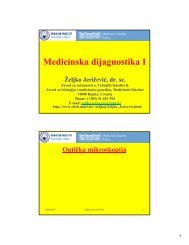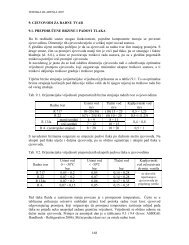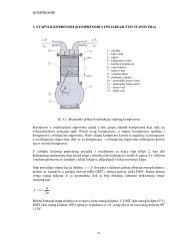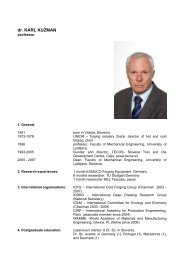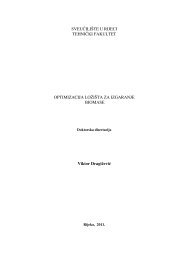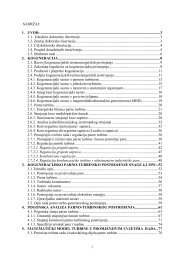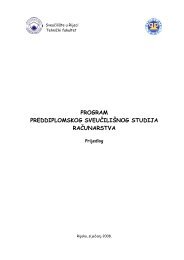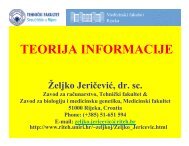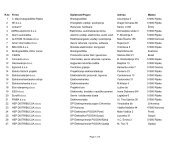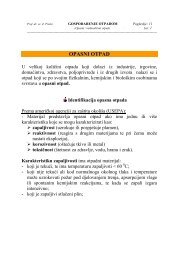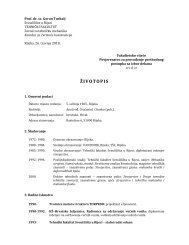universityâenterprise cooperation
universityâenterprise cooperation
universityâenterprise cooperation
You also want an ePaper? Increase the reach of your titles
YUMPU automatically turns print PDFs into web optimized ePapers that Google loves.
36<br />
standards in education, also in the light of<br />
the ongoing EU integration process of the<br />
region [67].<br />
In line with the emphasis of the Austrian<br />
EU Presidency on quality in education,<br />
the IX Conference of European Ministers<br />
of Education held in 2006, discussed<br />
the widening of the EHEA to the Western<br />
Balkans, the main themes in focus were<br />
the ongoing integration of the Western<br />
Balkan countries into the EHEA, the<br />
significance of qualification frameworks for<br />
education reforms in a Life-long learning<br />
perspective, and the role of the universities<br />
for the reform process as a point of<br />
synergy between education, research and<br />
innovation. The implementation of the<br />
Bologna objectives, the participation<br />
of higher education institutions in the<br />
new Community programmes, and the<br />
integration into the European Research Area<br />
(ERA), are vital for the higher education<br />
institutions of the Western Balkan region.<br />
Generated strategic paper a “Pact for<br />
Education” for the Western Balkans [60]<br />
has defined framework for the European<br />
support for educational reforms in the WBC<br />
region, intended to serve both as source of<br />
information and as a basis for discussion.<br />
The Task Force “Fostering and Building<br />
Human Capital” of the Regional Cooperation<br />
Council (RCC) adopted Action plan [90]<br />
in this area for period 2009-2010, on the<br />
occasion of its meeting held in June 2009,<br />
in Zagreb. Here are main upshots, related to<br />
three sides of knowledge triangle:<br />
1. Promotion of coherency and coordination<br />
between education, training, higher<br />
education, research and science by<br />
creating a platform for dialogue and<br />
<strong>cooperation</strong> of actors involved in these<br />
sectors is the main aim of TF;<br />
2. It is evident of the growing impact of the<br />
“knowledge triangle” on the economic<br />
and social development in SEE;<br />
3. Following cooperative action should be<br />
undertaken by TF:<br />
• Lobbying on highlighting the role<br />
of education, training, science and<br />
research as main factors for sustainable<br />
economic development and knowledgebased<br />
growth as well as towards policy<br />
measures aiming at enhancing innovation<br />
capacities and fostering excellence in<br />
education and research in SEE;<br />
• Cooperation of SEE institutions and<br />
organizations with EU and international<br />
institutions in the area of building and<br />
fostering human capital;<br />
• Providing information related to potential<br />
hosting institutions for mobility of<br />
students, teachers, education managers<br />
and researchers from SEE region;<br />
• Promotion and management of an innovative<br />
networks by providing a structure for <strong>cooperation</strong>;<br />
• Facilitating of establishment and sustainable<br />
functioning of clusters of knowledge (CoKs).<br />
4.1.2 Research side<br />
S&T system in the WBC Region has<br />
not recovered fully yet, after years of<br />
international isolation, political instability<br />
and economic depression. Though research<br />
systems in WBC (Western Balkan Countries)<br />
have undergone substantial institutional<br />
The “Pact for Education” for the Western Balkans as an initiative and result of the Austrian EU<br />
Presidency is in this sense a political initiative for the mobilization of existing obligations on<br />
the part of EU Member States and international partner institutions towards the region, which<br />
facilitates the timely integration of all the countries of the Western Balkans into the European<br />
educational area. The Pact for Education should thus increasingly support the respective national<br />
reform efforts and thus make a contribution to the European perspective of the region of the<br />
Western Balkans via education.<br />
The integration of the countries of the Western Balkans into the European education and higher<br />
education area in the sense of sustainable and also qualitatively new partnerships between the<br />
region and the EU through sufficient pre-accession support and through the transfer of knowledge<br />
and expertise is for this reason a strategic objective of the Pact for Education.



